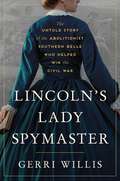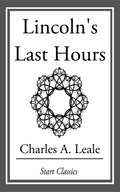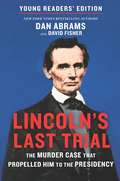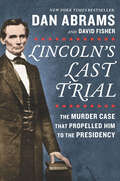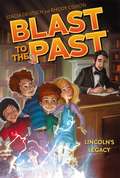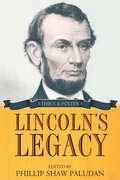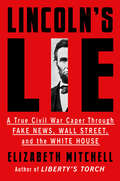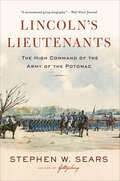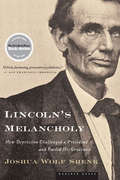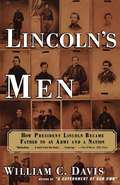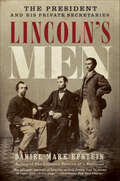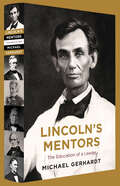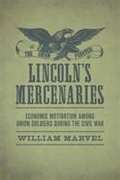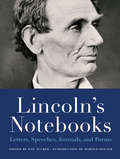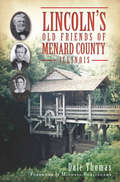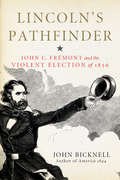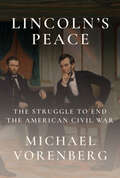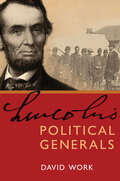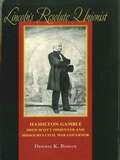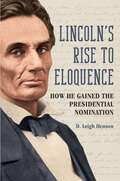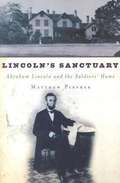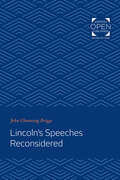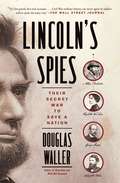- Table View
- List View
Lincoln's Lady Spymaster: The Untold Story of the Abolitionist Southern Belle Who Helped Win the Civil War
by Gerri WillisIn this gripping Civil War history, Fox Business's Gerri Willis charts the making of a spymaster genius. <p> Wealthy Southern belle Elizabeth Van Lew had it all. Money, charm, wit—the most elegant mansion in Richmond. So why risk everything to become a Union spy? The answer was simple: freedom. <P> Right in the heart of the Confederate capital, Elizabeth played the society lady while building a secret espionage network of slaves, Unionists, and prisoners of war. It would cost her almost everything. Flouting society’s expectations for women, Elizabeth infiltrated prisons and defied public opinion. Her story is filled with vivid personalities, including: Assassin John Wilkes Booth; Washington socialite and Southern spy Rose Greenhow; Prison escape artist Thomas Rose; Cavalry hero Ulrich Dahlgren; Cross-dressing intelligence agent Frank Stringfellow. <P> From grave robbery to a bold voyage across enemy lines, Elizabeth’s escapades only grew more daring. But it paid off. By the war’s end, she had agents in both the Confederate War Department and the Richmond White House, and her couriers provided General Ulysses S. Grant with crucial, daily intelligence for his final assault. With extensive and fresh research, Gerri Willis uncovers the Southern abolitionist heroine that the Lost Cause buried—an unbelievable tale of one woman’s courage, resistance, and liberation. Heartfelt, thrilling, and inspiring, Lincoln’s Lady Spymaster restores a forgotten hero to her rightful place as an American icon. <b>New York Times Bestseller</b>
Lincoln's Last Hours
by Charles A. LealeAddress delivered before the Commandery of the state of New York military order of the loyal legion of the United States at the regular meeting, February, 1909, city of New York in observance of the one hundredth anniversary of the birth of president Abraham Lincoln.
Lincoln's Last Trial Young Readers' Edition: The Murder Case That Propelled Him to the Presidency
by David Fisher Dan AbramsAt the end of the summer of 1859, twenty-two-year-old Peachy Quinn Harrison was accused of murder in Springfield, Illinois. The man hired to save his life was none other than self-taught lawyer Abraham Lincoln. But what would be Lincoln’s last case before his presidency posed many personal challenges. The murder victim had been an apprentice in Lincoln’s law office. The accused murderer was the son of a close friend and loyal supporter. To win the trial, Lincoln would have to form an unholy allegiance with a longtime enemy, a revivalist preacher he had twice run against for political office. And with the rise of newspapers, the nation was watching the presidential hopeful very, very closely.Based on actual court transcripts that include Lincoln’s own words and adapted from Dan Abrams and David Fisher’s New York Times bestseller, Lincoln’s Last Trial is both a twisty, turny true crime story and a vivid picture of Abraham Lincoln on the eve of his presidency. This thrilling, never-before-seen look at one of the most beloved figures in US history will captivate both young readers and adults alike.
Lincoln's Last Trial: The Murder Case That Propelled Him to the Presidency
by David Fisher Dan AbramsThe award-winning, New York Times–bestselling chronicle of the sensational murder trial that would be the capstone of Lincoln’s legal career.In the summer of 1859, twenty-two-year-old “Peachy” Quinn Harrison went on trial for murder in Springfield, Illinois. When Harrison’s father hired Abraham Lincoln to defend him, the case took on momentous meaning. Lincoln’s debates with Senator Stephen Douglas the previous fall had transformed the little-known, self-taught lawyer into a respected politician of national prominence. As Lincoln contemplated a dark-horse run for the presidency in 1860, this case involved great risk. A loss could diminish Lincoln’s untarnished reputation. But the case also posed painful personal challenges for Lincoln. The victim had been his friend and his mentor. The accused killer, whom Lincoln would defend, was the son of a close friend and loyal supporter. And to win this trial he would have to form an unholy allegiance with a longtime enemy, a revivalist preacher he had twice run against for political office.Lincoln’s Last Trial vividly captures Lincoln’s dramatic courtroom confrontations as he fights for his client—but also for his own blossoming political future. It is a moment in history that shines a light on our legal system, our history, and one of our greatest presidents.A Winner of the Barondess/Lincoln Award
Lincoln's Legacy (Blast to the Past #1)
by Stacia Deutsch Rhody Cohon David WenzelThird graders travel through time to keep history on track. Abigail loves Mondays, and so does the rest of class 305. That's the day Mr. Caruthers asks them cool questions about history. Today Mr. C. asks, "What if Abraham Lincoln never freed the slaves?" Abigail and her friends are ready to put their thinking caps on. But this time Mr. C. wants them to do more than put their heads together-he wants them to travel back in time. Turns out the "What If?" questions are real, and Mr. C. has just come back from a visit to the past. He needs their help because it looks like President Lincoln might quit and never free the slaves. With a time-travel gadget and only two hours to spare, Abigail and her friends are going back to the past. But even though time traveling isn't hard, convincing Abraham Lincoln not to give up isn't going to be easy... With a dollop of "The Magic Tree House," a dash of "Back to the Future," and pinch of "Bill & Ted's Excellent Adventure," "Blast to the Past" is a recipe for fun.
Lincoln's Legacy: Ethics and Politics
by William Miller Mark Summers Phillip S. Paludan Mark E. Neely Jr.The four new essays in Lincoln's Legacy describe major ethical problems that the sixteenth president navigated what can be learned from how he did so. The distinguished and award-winning Lincoln scholars William Miller, Mark E. Neely Jr., Phillip Shaw Paludan, and Mark Summers describe Lincoln’s attitudes and actions during encounters with questions of politics, law, constitutionalism, patronage, and democracy. The remarkably focused essays include an assessment of Lincoln's virtues in the presidency, the first study on Lincoln and patronage in more than a decade, a challenge to the cliché of Lincoln the democrat, and a study of habeas corpus, Lincoln, and state courts. On the eve of the bicentennial celebration of Lincoln’s birth, Lincoln’s Legacy highlights his enduring importance in contemporary conversations about law, politics, and democracy.
Lincoln's Lie: A True Civil War Caper Through Fake News, Wall Street, and the White House
by Elizabeth MitchellThis &“delicious, suspenseful . . . and cleverly written romp through a dramatic and forgotten moment in American history&” reveals how Lincoln manipulated the media during the Civil War—shining new light on the current &‘fake news&’ crisis (Elizabeth Gilbert) In 1864, during the bloodiest days of the Civil War, two newspapers published a call, allegedly authored by President Lincoln, for the immediate conscription of 400,000 more Union soldiers. New York streets erupted in pandemonium. Wall Street markets went wild. When Lincoln sent troops to seize the newspaper presses and arrest the editors, it became clear: The proclamation was a lie. Who put out this fake news? Was it a Confederate spy hoping to incite another draft riot? A political enemy out to ruin the president in an election year? Or was there some truth to the proclamation—far more truth than anyone suspected? Unpacking this overlooked historical mystery for the first time, journalist Elizabeth Mitchell takes readers on a dramatic journey from newspaper offices filled with heroes and charlatans to the haunted White House confinement of Mary Todd Lincoln, from the packed pews of the celebrated preacher Reverend Henry Ward Beecher&’s Plymouth Church to the War Department offices in the nation&’s capital and a Grand Jury trial. In Lincoln&’s Lie, Mitchell brings to life the remarkable story of the manipulators of the news and why they decided to play such a dangerous game during a critical period of American history. Her account of Lincoln&’s troubled relationship to the press and its role in the Civil War is one that speaks powerfully to our current political crises: fake news, profiteering, Constitutional conflict, and a president at war with the press.
Lincoln's Lieutenants: The High Command of the Army of the Potomac
by Stephen W. SearsA multilayered group biography of the Civil War commanders who led the Army of the Potomac: “a staggering work . . . by a masterly historian” (Kirkus, starred review).The high command of the Army of the Potomac was a changeable, often dysfunctional band of brothers, going through the fires of war under seven commanding generals in three years, until Grant came east in 1864. The men in charge all too frequently appeared to be fighting against the administration in Washington instead of for it, increasingly cast as political pawns facing down a vindictive congressional Committee on the Conduct of the War.President Lincoln oversaw, argued with, and finally tamed his unruly team of lieutenants as the eastern army was stabilized by an unsung supporting cast of corps, division, and brigade generals. With characteristic style and insight, Stephen Sears brings these courageous, determined officers, who rose through the ranks and led from the front, to life and legend. “A masterful synthesis . . . A narrative about amazing courage and astonishing gutlessness . . . It explains why Union movements worked and, more often, didn’t work in clear-eyed explanatory prose that’s vivid and direct.” —Chicago Tribune
Lincoln's Melancholy: How Depression Challenged a President and Fueled His Greatness
by Joshua Wolf ShenkA nuanced psychological portrait of Abraham Lincoln that finds his legendary political strengths rooted in his most personal struggles. Giving shape to the deep depression that pervaded Lincoln's adult life, Joshua Wolf Shenk&’s Lincoln&’s Melancholy reveals how this illness influenced both the President&’s character and his leadership. Mired in personal suffering as a young man, Lincoln forged a hard path toward mental health. Shenk draws on seven years of research from historical record, interviews with Lincoln scholars, and contemporary research on depression to understand the nature of Lincoln&’s unhappiness. In the process, Shenk discovers that the President&’s coping strategies—among them, a rich sense of humor and a tendency toward quiet reflection—ultimately helped him to lead the nation through its greatest turmoil.A New York Times Book Review Editors&’ ChoiceSELECTED AS A BEST BOOK OF THE YEAR: Washington Post Book World, Atlanta Journal-Constituion, St. Louis Post-Dispatch, Pittsburgh Post-GazetteAs Featured on the History Channel documentary Lincoln &“Fresh, fascinating, provocative.&”—Sanford D. Horwitt, San Francisco Chronicle&“Some extremely beautiful prose and fine political rhetoric and leaves one feeling close to Lincoln, a considerable accomplishment.&”—Andrew Solomon, New York Magazine&“A profoundly human and psychologically important examination of the melancholy that so pervaded Lincoln's life.&”—Kay Redfield Jamison, Ph.D., author of An Unquiet Mind
Lincoln's Men: How President Lincoln Became Father To an Army an
by William C. DavisI sit down to write you (a Soldier's Friend!)...My kind Friend of Friends you have the power to help me a grate deal...I have great Confidence in our Good President hoe has dun a grate deal for us poor Soldiers... So wrote Private Joe Hass to Abraham Lincoln, February 20, 1864. Like an extraordinary number of his fellow Union soldiers, he loved Lincoln as a father. Lincoln inspired feelings unlike those instilled by any previous commander-in-chief in America. In Lincoln's Men, William C. Davis draws on thousands of unpublished letters and diaries to tell the hidden story of how a new and untested president could become "Father Abraham" throughout both the army and the North as a whole. How did the Army of the Potomac, yearning for the grandeur of McClellan, turn instead to the comfort of Old Abe, and how was this change of loyalty crucial to final victory? How did Lincoln inspire the faith and courage of so many shattered men, wandering the inferno of Shiloh or entrenched in the siege of Vicksburg? Why did soldiers visiting Washington feel free to stroll into the White House and sit down to relax, as if it were their own home? Davis removes layers of mythmaking to recapture the moods and feelings of an army facing one of history's bloodiest conflicts. Tracing the popular fate of decisions to invoke conscription, to fire McClellan, and to free the slaves, Lincoln's Men casts a new light on our most famous president -- the light, that is, of the peculiar mass medium that was the Union Army. A motley band of talkers and letter writers, the soldiers spread news of Lincoln's appearances like wildfire, chortling at his ungainly posture in the saddle, rushing up to shake his hand and talk to him. The volunteers knew they could approach "Old Abe," "Honest Abe," "Uncle Abe," and "Father Abraham," and they cheered him thunderously. "The men could not be restrained from so honoring him," said Private Rice Bull. "He really was the ideal of the Army." The story of the making of Father Abraham is the story of America's second revolution, its rebirth. As one Union soldier and journalist put it, "Washington taught the world to know us, Lincoln taught us to know ourselves. The first won for us our independence, the last wrought out our manhood and self-respect."
Lincoln's Men: The President and His Private Secretaries
by Daniel Mark EpsteinLincoln's Men is the first narrative portrait of the three young men who served as Lincoln's secretaries during the Civil War. John Nicolay and John Hay lived in the White House, across the hall from the president's office, and they and William Stoddard spent more time with Lincoln than anyone else outside his immediate family. Lincoln used these three intelligent, articulate young men as a sounding board; they were the first audience for much of his writing from the period. From their unique vantage point, they had a front-row seat on the drama of war, but they also had a good time. Washington under siege was a city of endless receptions and parties. Daniel Mark Epstein captures the drama in each life. We see Nicolay, balancing his obligations to Lincoln with a long-distance engagement to his childhood sweetheart; Hay, the poet/amanuensis, in love with a famous and married actress; and Stoddard, a little too obsessed with gambling in the gold market. The secretaries left significant diaries, letters, and memoirs about Lincoln. Nicolay and Hay went on to distinguished careers in the Foreign Service after the war and later wrote the classic “authorized” biography of Lincoln, published in 1890 in ten volumes. An intimate and moving portrait of the Civil War White House, Lincoln's Men gives a vivid sense of what it was like to work for America's most brilliant president at the pivotal moment in the country's history. It is essential reading for fans of American history.
Lincoln's Mentors: The Education of a Leader
by Michael J. GerhardtA brilliant and novel examination of how Abraham Lincoln mastered the art of leadership“Abraham Lincoln had less schooling than all but a couple of other presidents, and more wisdom than every one of them. In this original, insightful book, Michael Gerhardt explains how this came to be." –H.W. Brands, Wall Street JournalIn 1849, when Abraham Lincoln returned to Springfield, Illinois, after two seemingly uninspiring years in the U.S. House of Representatives, his political career appeared all but finished. His sense of failure was so great that friends worried about his sanity. Yet within a decade, Lincoln would reenter politics, become a leader of the Republican Party, win the 1860 presidential election, and keep America together during its most perilous period. What accounted for the turnaround?As Michael J. Gerhardt reveals, Lincoln’s reemergence followed the same path he had taken before, in which he read voraciously and learned from the successes, failures, oratory, and political maneuvering of a surprisingly diverse handful of men, some of whom he had never met but others of whom he knew intimately—Henry Clay, Andrew Jackson, Zachary Taylor, John Todd Stuart, and Orville Browning. From their experiences and his own, Lincoln learned valuable lessons on leadership, mastering party politics, campaigning, conventions, understanding and using executive power, managing a cabinet, speechwriting and oratory, and—what would become his most enduring legacy—developing policies and rhetoric to match a constitutional vision that spoke to the monumental challenges of his time.Without these mentors, Abraham Lincoln would likely have remained a small-town lawyer—and without Lincoln, the United States as we know it may not have survived. This book tells the unique story of how Lincoln emerged from obscurity and learned how to lead.
Lincoln's Mercenaries: Economic Motivation Among Union Soldiers During the Civil War (Conflicting Worlds: New Dimensions of the American Civil War)
by William MarvelIn this book, the author considers whether poor northern men bore the highest burden of military service during the American Civil War. Examining data on median family wealth from the 1860 United States Census, Marvel reveals the economic conditions of the earliest volunteers from each northern state during the seven major recruitment and conscription periods of the war. The results consistently support the conclusion that the majority of these soldiers came from the poorer half of their respective states' population, especially during the first year of fighting. A fascinating, comprehensive study, the book illustrates how an array of social and economic factors drove poor northern men to rely on military wages to support themselves and their families during the war.
Lincoln's Notebooks: Letters, Speeches, Journals, and Poems (Notebook Series)
by Harold Holzer Dan TuckerThis unique collection combines the public and private words of our most beloved and eloquent American president into one essential notebook of his writings.In addition to being one of the most admired and successful politicians in history, Abraham Lincoln was a gifted writer whose speeches, eulogies, and addresses are quoted often and easily recognized all around the world. Arranged chronologically into topics such as family and friends, the law, politics and the presidency, story-telling, religion, and morality, Lincoln's Notebooks includes his famous letters to Ulysses S. Grant, Horace Greeley, and Henry Pierce as well as personal letters to Mary Todd Lincoln and his note to Mrs. Bixby, the mother who lost five sons during the Civil War. Also included are full texts of the Gettysburg Address, the Emancipation Proclamation, both of Lincoln's inaugural addresses, and his famous "A House Divided" speech. Rarely seen writings like poetry he composed as teenager give insight into Lincoln's personality and private life.Richly illustrated with seventy-five photographs, facsimiles of letters, and more, plus commentary throughout by Dan Tucker and a foreword by Lincoln expert Harold Holzer, Lincoln's Notebooks is an intimate look at this esteemed president.
Lincoln's Old Friends of Menard County, Illinois
by Dale Thomas Michael BurlingameAt the age of twenty-two, Abraham Lincoln arrived in New Salem, Illinois, as a "strange, friendless, uneducated, penniless boy" (in his own words). He did not remain friendless for long. Meet the community that welcomed him: Bennett and Elizabeth Abell, the couple who guided him through heartache; Mary Owens, Elizabeth Abell's sister who helped educate him in the realm of the heart; Mentor Graham, the schoolmaster who helped teach him; Bowling Green, the jolly justice of the peace who allowed Lincoln to practice law before his court; and Slicky Bill Greene, who clerked with Lincoln at a frontier dry goods store. Making good use of primary sources overlooked by many historians, Dale Thomas helps flesh out the important story of Lincoln's formative years in Menard County.
Lincoln's Pathfinder: John C. Fremont and the Violent Election of 1856
by John BicknellThe 1856 presidential race was the most violent peacetime election in American history. War between proslavery and antislavery settlers raged in Kansas; a congressman shot an Irish immigrant at a Washington hotel; and another congressman beat a US senator senseless on the floor of the Senate. But amid all the violence, the campaign of the new Republican Party, headed by famed explorer John C. Frémont, offered a ray of hope: a major party dedicated to limiting the spread of slavery. For the first time, women and African Americans actively engaged in a presidential contest, and the candidate's wife, Jessie Benton Frémont, played a central role in both planning and executing strategy, and was a public face of the campaign. Even enslaved blacks in the South took hope from Frémont's crusade.The 1856 campaign was also run against the backdrop of a country on the move, with settlers continuing to spread westward facing unimagined horrors, a terrible natural disaster that took hundreds of lives in the South, and one of the most famous Supreme Court cases in history, which set the stage for the Civil War. Frémont lost, but his strong showing in the North proved that a sectional party could win a national election, blazing the trail for Abraham Lincoln's victory four years later.
Lincoln's Peace: The Struggle to End the American Civil War
by Michael VorenbergOne historian&’s journey to find the end of the Civil War—and, along the way, to expand our understanding of the nature of war itself and how societies struggle to draw the line between war and peaceWe set out on the James River, March 25, 1865, aboard the paddle steamboat River Queen. President Lincoln is on his way to General Grant&’s headquarters at City Point, Virginia, and he&’s decided he won&’t return to Washington until he&’s witnessed, or perhaps even orchestrated, the end of the Civil War. Now, it turns out, more than a century and a half later, historians are still searching for that end. Was it April 9, at Appomattox, as conventional wisdom holds, where Lee surrendered to Grant in Wilmer McLean&’s parlor? Or was it ten weeks afterward, in Galveston, where a federal commander proclaimed Juneteenth the end of slavery? Or perhaps in August of 1866, when President Andrew Johnson simply declared &“the insurrection is at an end&”? That the answer was elusive was baffling even to a historian of the stature of Michael Vorenberg, whose work served as a key source of Steven Spielberg&’s Lincoln. Vorenberg was inspired to write this groundbreaking book, finding its title in the peace Lincoln hoped for but could not make before his assassination. A peace that required not one but many endings, as Vorenberg reveals in these pages, the most important of which came well more than a year after Lincoln&’s untimely death. To say how a war ends is to suggest how it should be remembered, and Vorenberg&’s search is not just for the Civil War&’s endpoint but for its true nature and legacy, so essential to the American identity. It&’s also a quest, in our age of &“forever wars,&” to understand whether the United States's interminable conflicts of the current era have a precedent in the Civil War—and whether, in a sense, wars ever end at all, or merely wax and wane.
Lincoln's Political Generals
by David WorkAt the beginning of the Civil War, President Abraham Lincoln sought to bind important political leaders to the Union by appointing them as generals. The task was formidable: he had to find enough qualified officers to command a military that would fight along a front that stretched halfway across the continent. West Point hadn't graduated enough officers, and many of its best chose to fight for the Confederacy. Lincoln needed loyal men accustomed to organization, administration, and command. He also needed soldiers, and political generals brought with them their constituents and patronage power. As the war proceeded, the value of the political generals became a matter of serious dispute. Could politicians make the shift from a political campaign to a military one? Could they be trusted to fight? Could they avoid destructive jealousies and the temptations of corruption? And with several of the generals being Irish or German immigrants, what effect would ethnic prejudices have on their success or failure? In this book, David Work examines Lincoln's policy of appointing political generals to build a national coalition to fight and win the Civil War. Work follows the careers of sixteen generals through the war to assess their contributions and to ascertain how Lincoln assessed them as commander-in-chief. Eight of the generals began the war as Republicans and eight as Democrats. Some commanded armies, some regiments. Among them were some of the most famous generals of the Union--such as Francis P. Blair Jr., John A. Dix, John A. Logan, James S. Wadsworth--and others whose importance has been obscured by more dramatic personalities. Work finds that Lincoln's policy was ultimately successful, as these generals provided effective political support and made important contributions in military administration and on the battlefield. Although several of them proved to be poor commanders, others were effective in exercising influence on military administration and recruitment, slavery policy, and national politics.
Lincoln's Political Thought
by George KatebAt the center of Lincoln's political thought and career is an intense passion for equality that runs so deep in the speeches, messages, and letters that it has the force of religious conviction for Lincoln. George Kateb examines these writings to reveal that this passion explains Lincoln's reverence for both the Constitution and the Union.
Lincoln's Resolute Unionist: Hamilton Gamble, Dred Scott Dissenter and Missouri's Civil War Governor (Southern Biography Series)
by Dennis K. BomanAs provisional governor of Missouri during the Civil War, Hamilton Gamble (1798--1864) worked closely with the Lincoln administration to keep the state from seceding from the Union. Without Gamble and other loyal Unionist governors, the war in the West might have been lost. Dennis Boman's full-scale account of Gamble's life tells the little-known story of a prominent frontier lawyer who became chief justice of the Missouri Supreme Court and boldly dissented in the infamous Dred Scott decision. Revealing how Gamble, one of the wealthiest and most renowned citizens of pre--Civil War Missouri, fought to end slavery and to protect the integrity of the Union, Lincoln's Resolute Unionist corrects prevailing notions about solidarity among the South's antebellum elite on these issues.The slaveholding border state of Missouri figured greatly in the sectional crisis from the time of its controversial admission to the Union up through the war itself, when it was the site of internecine battles between Unionists and Confederates. The complexities of the period and of the political alliances formed then emerge clearly in Boman's biography of Gamble. A fundamental conservatism -- Gamble believed judges should interpret, not make, law -- led the southern slave owner to dissent from his colleagues' proslavery decision in Scott v. Emerson. These same principles, along with Gamble's Whig affiliation and Christian convictions, made firm his antisecessionist stance despite his proslavery predilections. Boman provides a groundbreaking analysis of Lincoln's involvement in Missouri's affairs, including his assistance to Gamble in maintaining security and passing a state ordinance for gradual emancipation. Lincoln's Resolute Unionist brings to light in a compelling fashion the meaning -- and the drama -- of the life of a key figure at a critical time in American history.
Lincoln's Rise to Eloquence: How He Gained the Presidential Nomination
by D. Leigh HensonAt turns eloquent and earthy, Abraham Lincoln’s rhetoric played a vital role in his success as a politician and statesman. D. Leigh Henson examines Lincoln’s pre-presidential development as a rhetorician, the purposes and methods behind his speeches and writings, and how the works contributed to his political rise. Lincoln’s close study of the rhetorical process drew on sources that ranged from classical writings to foundational American documents to the speeches of Daniel Webster. As Henson shows, Lincoln applied his learning to combine arguments on historical, legal, and moral grounds with appeals to emotion and his own carefully curated credibility. Henson also explores Lincoln’s use of the elements of structural design to craft coherent arguments that, whatever their varying purposes, used direct and plain language to reach diverse audiences--and laid the groundwork for his rise to the White House. Insightful and revealing, Lincoln’s Rise to Eloquence follows Lincoln from his early career through the years-long clashes with Stephen A. Douglas to trace the future president’s evolution as a communicator and politician.
Lincoln's Sanctuary: Abraham Lincoln and the Soldiers' Home
by Matthew PinskerAfter the heartbreaking death of his son Willie, Abraham Lincoln and his family fled the gloom that hung over the White House, moving into a small cottage in Washington, D.C., on the grounds of the Soldiers' Home, a residence for disabled military veterans. In Lincoln's Sanctuary, historian Matthew Pinsker offers a fascinating portrait of Lincoln's stay in this cottage and tells the story of the president's remarkable growth as a national leader and a private man.
Lincoln's Speeches Reconsidered
by John Channing BriggsOriginally published in 2005. Throughout the fractious years of the mid-nineteenth century, Abraham Lincoln's speeches imparted reason and guidance to a troubled nation. Lincoln's words were never universally praised. But they resonated with fellow legislators and the public, especially when he spoke on such volatile subjects as mob rule, temperance, the Mexican War, slavery and its expansion, and the justice of a war for freedom and union.In this close examination, John Channing Briggs reveals how the process of studying, writing, and delivering speeches helped Lincoln develop the ideas with which he would so profoundly change history. Briggs follows Lincoln's thought process through a careful chronological reading of his oratory, ranging from Lincoln's 1838 speech to the Springfield Lyceum to his second inaugural address.Recalling David Herbert Donald's celebrated revisionist essays (Lincoln Reconsidered, 1947), Briggs's study provides students of Lincoln with new insight into his words, intentions, and image.
Lincoln's Spies: Their Secret War to Save a Nation
by Douglas WallerA major addition to the history of the Civil War, Lincoln’s Spies is a riveting account of the secret battles waged by Union agents to save a nation. Filled with espionage, sabotage, and intrigue, it is also a striking portrait of a shrewd president who valued what his operatives uncovered. Veteran journalist Douglas Waller, who has written ground-breaking intelligence histories, turns his sights on the shadow war of four secret agents for the North—three men and one woman. From the tense days before Abraham Lincoln’s inauguration in 1861 to the surrender at Appomattox four years later, Waller delivers a fast-paced narrative of the heroes—and scoundrels—who informed Lincoln’s generals on the enemy positions for crucial battles and busted up clandestine Rebel networks. Famed detective Allan Pinkerton mounted a successful covert operation to slip Lincoln through Baltimore before his inauguration to foil an assassination attempt. But he failed as General George McClellan’s spymaster, delivering faulty intelligence reports that overestimated Confederate strength. George Sharpe, an erudite New York lawyer, succeeded Pinkerton as spymaster for the Union’s Army of the Potomac. Recruiting skilled operatives, some of whom dressed in Rebel uniforms, Sharpe ran highly successful intelligence operations that outpaced anything the enemy could field. Elizabeth Van Lew, a Virginia heiress who hated slavery and disapproved of secession, was one of Sharpe’s most successful agents. She ran a Union spy ring in Richmond out of her mansion, with dozens of agents feeding her military and political secrets she funneled to General Ulysses S. Grant as his army closed in on the Confederate capital. Van Lew became one of the unsung heroes of the war. Lafayette Baker was a handsome Union officer with a controversial past, whose agents clashed with Pinkerton’s operatives. The unscrupulous Baker assembled a retinue of disreputable spies, thieves, and prostitutes to root out traitors in Washington, D.C. But he failed at his most important mission: uncovering the threat to Lincoln from John Wilkes Booth and his gang. Behind these secret operatives was a president, one of our greatest, who was an avid consumer of intelligence and a ruthless aficionado of clandestine warfare, willing to take chances to win the war. Lincoln’s Spies, as Waller vividly depicts in his excellent new book, set the template for the dark arts the CIA would practice in the future.
Lincoln's Springfield Neighborhood
by Richard E. Hart Bonnie E PaullWhen an emotional Abraham Lincoln took leave of his Springfield neighbors, never to return, his moving tribute to the town and its people reflected their profound influence on the newly elected president. His old neighborhood still stands today as a National Historic Site. The story of the life Lincoln and his family built there returns to us through the careful work of authors Bonnie E. Paull and Richard E. Hart. Journey back in time and meet this diverse but harmonious community as it participated in the business of everyday living while gradually playing a larger role on the national stage.
